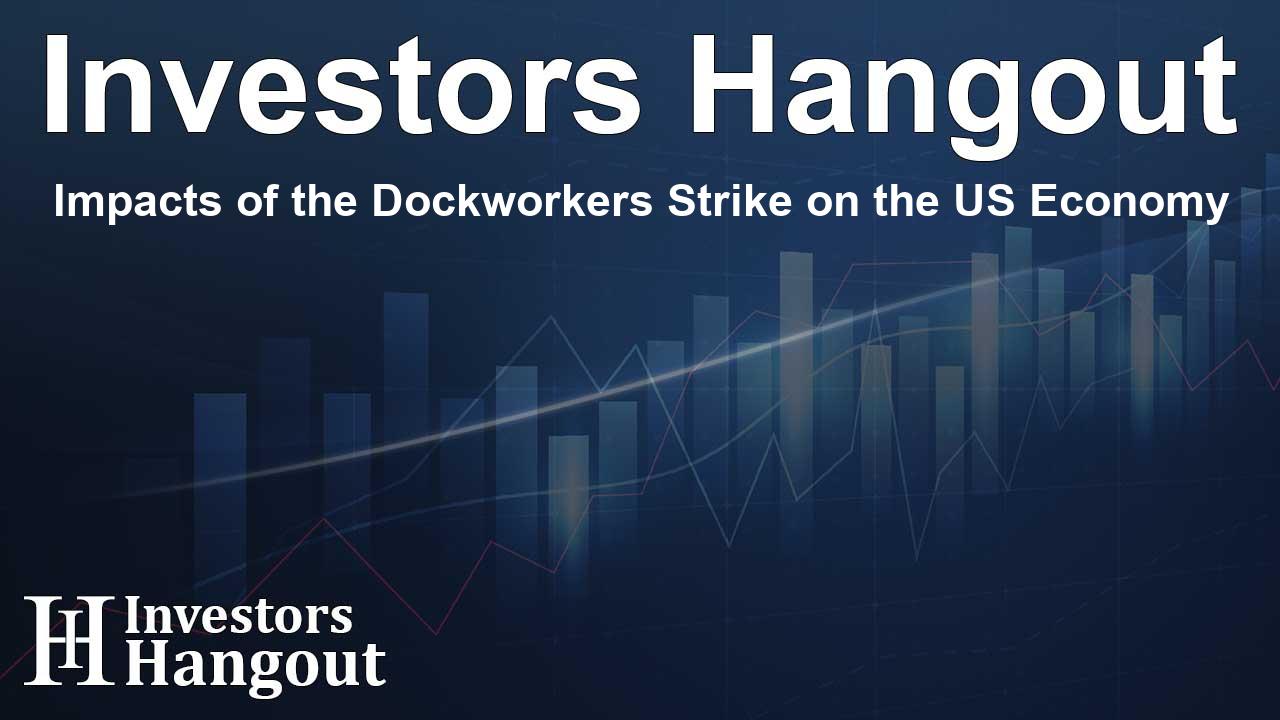Impacts of the Dockworkers Strike on the US Economy

Impacts of the Dockworkers Strike on the US Economy
The current strike by dockworkers is causing ripples through the US economy, significantly affecting operations at key ports. Analysts from Morgan Stanley have shared insights into how this situation could unfold if the strike persists.
Disruptions to Trade and Economic Activity
With ports along the East Coast and Gulf Coast handling a substantial 30% of US imports and exports, any disruption in this area is bound to have serious consequences. These water channels are vital for transporting goods across the nation.
Potential Inflationary Pressures
A protracted strike could lead to increased prices for essential items, particularly food and beverages. The inability to process shipments through affected ports may create shortages, consequently elevating prices and contributing to broader inflationary pressures in the economy.
Effects on Local Economies
Local production could be adversely impacted as businesses struggle to source necessary supplies. The repercussions of a lengthy strike may stretch beyond the docks, influencing payroll figures across various sectors reliant on imported materials.
Blocked Shipments
Currently, shipments of vital goods, ranging from food to automobiles, have been halted at several ports from the Northeast to Southern US. The dockworkers commenced their walkout following unsuccessful negotiations for a new contract.
Negotiation Standoff
This dispute involves the International Longshoremen's Association (ILA), representing about 45,000 dockworkers, and the United States Marine Alliance (USMX), which comprises shipping firms and port authorities. Workers are advocating for better compensation and protections against automation in the workplace.
Failed Negotiations and Future Outlook
The ILA sought a refreshed six-year contract before an agreed deadline. However, the USMX's final proposal, though it included a significant wage hike, was deemed unsatisfactory by the union leaders.
Commitment of Dockworkers
Amidst these challenges, the ILA remains firm in its resolve. ILA leader Harold Daggett has expressed that dockworkers are prepared to persist until their demands are adequately met. This level of commitment may prolong the current situation, leading to further economic implications if no resolution is reached.
Frequently Asked Questions
What regions are affected by the dockworkers strike?
The strike is impacting ports from the US East Coast to the Gulf Coast, notably affecting trade and shipment processes.
How much of US trade is conducted through the affected ports?
Analysts estimate that about 30% of American imports and exports flow through these ports.
What are dockworkers requesting in their negotiations?
Dockworkers are seeking improved wages and protections against automation within their jobs.
What could be the economic consequences of a prolonged strike?
An extended strike may lead to inflationary pressures, increased prices for goods, and disruptions in local economies.
Who represents the dockworkers in these negotiations?
The International Longshoremen's Association (ILA) represents the dockworkers, while the employers are represented by the United States Marine Alliance (USMX).
About Investors Hangout
Investors Hangout is a leading online stock forum for financial discussion and learning, offering a wide range of free tools and resources. It draws in traders of all levels, who exchange market knowledge, investigate trading tactics, and keep an eye on industry developments in real time. Featuring financial articles, stock message boards, quotes, charts, company profiles, and live news updates. Through cooperative learning and a wealth of informational resources, it helps users from novices creating their first portfolios to experts honing their techniques. Join Investors Hangout today: https://investorshangout.com/
Disclaimer: The content of this article is solely for general informational purposes only; it does not represent legal, financial, or investment advice. Investors Hangout does not offer financial advice; the author is not a licensed financial advisor. Consult a qualified advisor before making any financial or investment decisions based on this article. The author's interpretation of publicly available data shapes the opinions presented here; as a result, they should not be taken as advice to purchase, sell, or hold any securities mentioned or any other investments. The author does not guarantee the accuracy, completeness, or timeliness of any material, providing it "as is." Information and market conditions may change; past performance is not indicative of future outcomes. If any of the material offered here is inaccurate, please contact us for corrections.